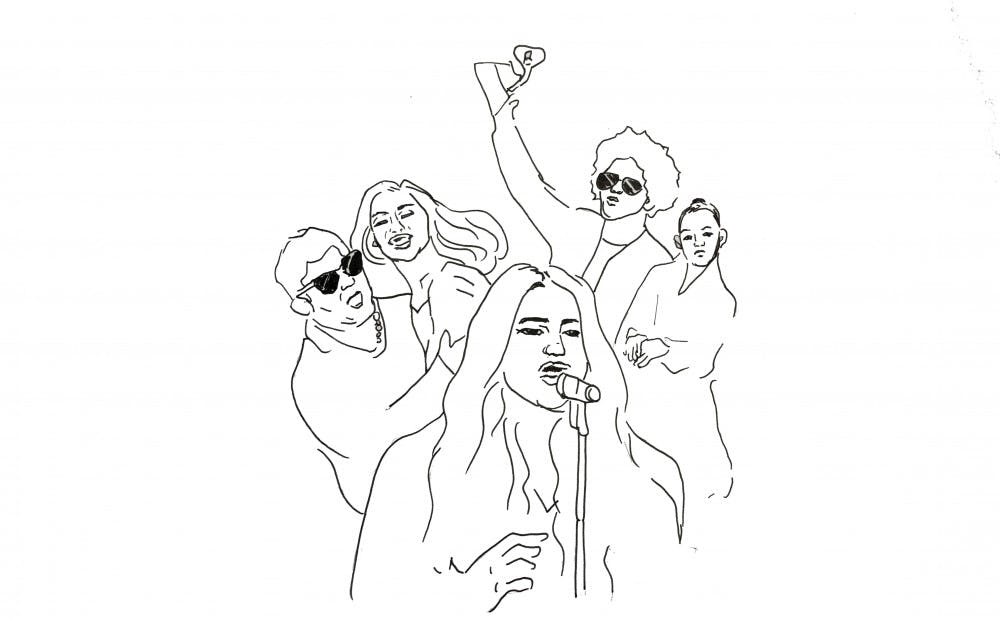As I sprinted back to my computer in Harnwell from a late Sunday night meeting, only one thing was on my mind: whether or not the Grammys would finally award a lauded hip–hop or traditional R&B artist its highest honors. Unfortunately, as I opened the live stream with anticipation, the Recording Academy decided to stick to the worrisome trend of average pop singers or artsy musicians that lack any in-depth quality. Pop performer Bruno Mars was handed Record of the Year, Song of the Year, and (most absurdly) Album of the Year.
This is nothing personal against Mr. Mars—he has an outstanding voice and undeniable talent, but in no way did he deserve to take all three awards, let alone one. In a year where Kendrick Lamar, Jay–Z, and Childish Gambino all released critically acclaimed albums and singles, he swept it all. Song of the year? Instead of Logic’s “1–800–273–8255,” an impactful track about suicide, or Jay–Z’s “4:44,” a gripping story about the personal failure of his infidelity, Mars won for “That’s What I Like,” which is essentially about his attempt to woo a lady with extravagant spending habits. Record of the year? Lamar released “Humble,” an outstanding hard–hitting challenge towards his competition; Jay–Z made “The Story of O.J.,” a stark critique of black stereotypes; and Gambino released “Redbone,” the smoothly beautiful hit that prompted the return of old–fashion R&B to prominence. Still, Mars took the award for “24K Magic,” nothing more than a simple party anthem.
The most egregious error, however, is Album of the Year. I usually try to avoid bringing up critical reception because of an occasional disconnect between reviewers and the average individual, but the separation here is too large to ignore. Mars’s 24K Magic received a 70/100 on Metacritic, a leading review aggregator. A damn 70/100. By comparison, Gambino’s “Awaken, My Love!” received a 77/100, Jay–Z’s 4:44 an 82/100, Lamar’s Damn a 95/100, and Lorde's Melodrama a 91/100. It’s also not as if all of the other albums lagged far behind 24K Magic in commercial performance—Damn was also certified double Platinum by the RIAA and had viral singles such as “Humble,” “Loyalty,” and “Love.” How, in any feasible way, does one justify the choice of 24K Magic as album of the year? Ridiculous.
These results are part of a disturbing pattern in the most major category at the last five Grammys. Since 2014, Lamar and Beyoncé have alternated releasing acclaimed albums each year, and have lost every time. In 2016, it was particularly confusing when Taylor Swift’s 1989, a standard pop album with a simple positive reception, managed to defeat Lamar’s socially conscious, culturally impactful To Pimp a Butterfly. Each show, an arbitrary alternative–style release (such as Daft Punk’s Random Access Memories or Beck’s Morning Phase) or a generic commercially successful pop record (as in 1989 or Adele’s 25) has won instead of a hip hop or R&B masterpiece.
Is the Recording Academy out of touch? Clearly—its members are people with long careers in the music business that seem to struggle to appreciate newer forms of artistry. Rap has risen to the top of the industry in terms of popularity, yet it hasn't been awarded since Outkast received Album of the Year honors for Speakerboxx/The Love Below over 14 years ago. Frankly, I have no idea what can be done to fix the problem at this point except to replace the Academy's leadership with a younger crowd. As long as the “safe” choice continues to be selected, the most famous musical awards show will continue to lose its credibility.







